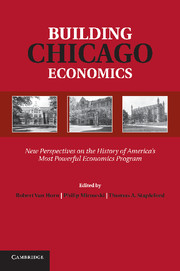 Building Chicago Economics
Building Chicago Economics Book contents
- Frontmatter
- Contents
- Figures and Tables
- Contributors
- Blueprints
- Orientation: In Search of the Chicago School
- Part One Economics Built for Policy: the Legacy of Milton Friedman
- Part Two Constructing the Institutional Foundations of the Chicago School
- Part Three Imperial Chicago
- Six Chicago Price Theory and Chicago Law and Economics
- Seven Intervening in Laissez-Faire Liberalism
- Eight Allusions to Evolution
- Nine On the Origins (at Chicago) of Some Species of Neoliberal Evolutionary Economics
- Part Four Debating “Chicago Neoliberalism”
- Index
- References
Seven - Intervening in Laissez-Faire Liberalism
Chicago’s Shift on Patents
from Part Three - Imperial Chicago
Published online by Cambridge University Press: 05 November 2011
- Frontmatter
- Contents
- Figures and Tables
- Contributors
- Blueprints
- Orientation: In Search of the Chicago School
- Part One Economics Built for Policy: the Legacy of Milton Friedman
- Part Two Constructing the Institutional Foundations of the Chicago School
- Part Three Imperial Chicago
- Six Chicago Price Theory and Chicago Law and Economics
- Seven Intervening in Laissez-Faire Liberalism
- Eight Allusions to Evolution
- Nine On the Origins (at Chicago) of Some Species of Neoliberal Evolutionary Economics
- Part Four Debating “Chicago Neoliberalism”
- Index
- References
Summary
The Chicago School is typically associated with a pro-patent position: They have defended patents on the grounds that they are vital to encourage innovation and have condemned claims that patents allow patent-holding firms to extend their monopoly power from one market to another. The Nobel Prize–winning Chicago economist, George Stigler, claimed that an inventor’s financial incentive was optimum only if he had exclusive and perpetual ownership of the patent. Steven Cheung, a third-generation representative of the Chicago School, observed in 1977: “In a free society an individual owns his brain, and by way of a number of different arrangements he may utilize and market the outputs of this mental resource to generate income” (Cheung , 597). To Cheung, the patent system was the best way to facilitate this generation of income. In 1973, Ward Bowman, a principal proponent of the Chicago law and economics movement in the 1960s and 1970s, maintained that alleged forms of patent misuse might “actually be the most efficient use of the patent from the social as well as the private point of view. It pays monopolists as well as competitors to be efficient” (1973, 9). More recently, in 2006, Richard Epstein, a public face of Chicago law and economics, defended the pharmaceutical industry from prospective regulations. Taking a pro-patent position, he stated, “[Pharmaceutical companies] are very heavily dependent on the patent law, [which] have allowed these firms to bring a wide variety of vital products to market” (Epstein ).
However, members of the Chicago School did not always take a pro-patent position. In the 1930s, the respected University of Chicago professor and self-identified classical liberal, Henry Simons, described monopoly in all its forms, including “gigantic corporations” and “other agencies of price control,” as “the great enemy of democracy” because they undermined the necessary condition for democracy to flourish, namely, a competitive market. In championing democracy and competitive markets, Simons displayed a broad hostility toward patents and claimed that the patent system enabled the creation and extension of monopoly power.
- Type
- Chapter
- Information
- Building Chicago EconomicsNew Perspectives on the History of America's Most Powerful Economics Program, pp. 180 - 207Publisher: Cambridge University PressPrint publication year: 2011
References
- 12
- Cited by
